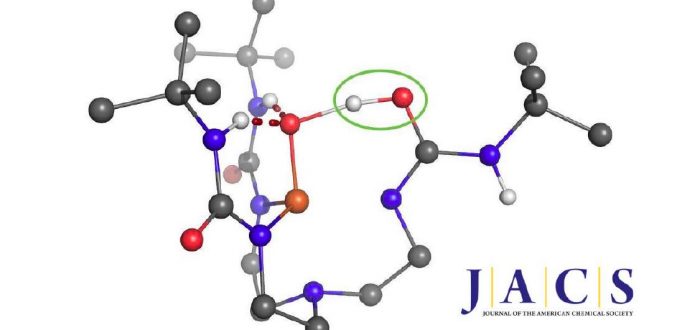Spin states of transition-metal complexes are essential for understanding many cases in biology, medicine, catalysis, and photonics. The choice of theoretical method, basis set, solvation and many other effects represent factors that need to be considered to be able to deal with the close-lying spin states in coordination compounds. However, the assignment of spin states
- sec.iqcc@udg.edu
- +34 972 41 83 57
News
Today a new paper was published in Adv. Synth. Catal. on enantioselective cascade cyclopropanation reactions catalyzed by rhodium(I), through the asymmetric synthesis of vinylcyclopropanes. Ò. Torres, A. Roglans, and A. Pla-Quintana “An Enantioselective Cascade Cyclopropanation Reaction Catalyzed by Rhodium(I): Asymmetric Synthesis of Vinylcyclopropanes” Adv. Synth. Catal. 2016, 358, 3512-3516 DOI: 10.1002/adsc.201600789 It also featured on the
Today took place in Girona the Second Supramolecular Symposium in Girona organized by the IQCC, where we had the pleasure of having three renowned speakers from the field of supramolecular chemistry: Between the three of them, a variety of different topics were discussed, ranging from cavitands, self-assembly, robots, metal-organic frameworks, mathematics, polyoxometalates, philosophy, origin of
Two metastable NiIII complexes, [NiIII(OAc)(L)] and [NiIII(ONO2)(L)] (L = N,N’-(2,6-dimethylphenyl)-2,6-pyridinedicarboxamidate, OAc = acetate), were prepared, adding to the previously prepared [NiIII(OCO2H)(L)], with the purpose of probing the properties of terminal late-transition metal oxidants. These high-valent oxidants were prepared by the one-electron oxidation of their NiII precursors ([NiII(OAc)(L)]? and [NiII(ONO2)(L)]?) with tris(4-bromophenyl)ammoniumyl hexachloroantimonate. Fascinatingly, the reaction
High-valent terminal copper–nitrene species have been postulated as key intermediates in copper-catalyzed aziridination and amination reactions. The high reactivity of these intermediates has prevented their characterization for decades, thereby making the mechanisms ambiguous. Very recently, the Lewis acid adduct of a copper–nitrene intermediate was trapped at ?90?°C and shown to be active in various oxidation
One of the Plenary Speakers of the Girona Seminar, Prof. Borovik (UC Irvine), asked Prof. Swart for his help in understanding where the proton goes in a high-valent “Fe(IV)-hydroxo” complex. Together with Adrià Romero, they were able to figure out that there were four viable possibilities where the proton would be either at the “oxo”-oxygen,
Terminal high-valent metal–oxygen species are key reaction intermediates in the catalytic cycle of both enzymes (e.g., oxygenases) and synthetic oxidation catalysts. While tremendous efforts have been directed toward the characterization of the biologically relevant terminal manganese–oxygen and iron–oxygen species, the corresponding analogues based on late-transition metals such as cobalt, nickel or copper are relatively scarce.
This September, our former member of IQCC Marc Garcia-Borràs was awarded the Premi Extraordinari for the best PhD thesis in 2015 from the University of Girona. Last year, he defended with success his PhD thesis on “Structure and reactivity of endohedral (metallo)fullerenes”, supervised by Josep M. Luis and Miquel Solà. Now, Marc is continuing his research as a
The IQCC will be organizing a special one-day symposium on Friday October 21 in the afternoon (Aula Magna, Fac. Ciències UdG, 15.30-20.00h), with three internationally renowned speakers in the field of supramolecular chemistry. In supramolecular chemistry the chemical systems are built up from molecular subunits that are held together by non-covalent interactions. These may be weak
Introduction Since 1993 the Institut de Química Computacional i Catàlisi (IQCC) has been organizing the biannual series of conferences called the Girona Seminars. The early editions (until 2003) were focused on molecular similarity (main organizer Prof. Ramon Carbó-Dorca), which changed in 2006 when every new edition a different topic was chosen (main organizer Prof. Miquel










